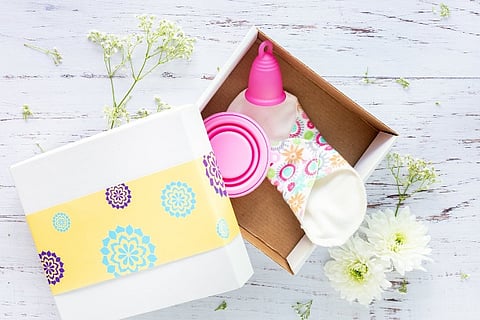

Muhamma, a gram panchayat in Alappuzha district, is looking to become a synthetic sanitary napkin free village. Five months ago, it was decided at a panchayat meeting that the village should reduce waste generation. It was then that the suggestion was put forth - the initiative should begin with eliminating disposable sanitary napkins.
"We have learnt that the plastic content in a packet of sanitary napkins is equal to four plastic carry bags. So, what is the point in banning plastic carry bags? That is how we decided to begin with napkins," panchayat president J Jayalal told TNM.
However, the women of the panchayat have apprehensions about the move.
As a beginning, the panchayat started awareness camps and classes in schools, promoting reusable cloth pads and menstrual cups. "Around one lakh used napkins are generated on a monthly basis. We don't have technologies to treat this waste scientifically. Now they are being dumped in soil and water and are causing pollution," Jayalal said.
The panchayat had assigned ASHA (Accredited Social Health Activist) workers to visit every household and convince the women to switch to reusable napkins.
Suchitra, a homemaker from Muhamma, says, "The ASHA worker had come. She explained the need for using eco-friendly pads. But, we have confusions about how to switch suddenly. Earlier, I used cloth instead of pads. How difficult it was! Moreover, it was a pain to wash and dry them. So we have no idea how cloth pads will be different. This is the first time we are hearing about cups. They have explained how to use it, but I can't be sure about it until we start using the cup. Anyway, we are ready to give it a try."
The ASHA workers are also required to get the number of women who need menstrual cups or reusable napkins.
"Once we get the approximate numbers, we will order and distribute them initially. A maximum of four cloth pads and one menstrual cup will be provided to all women, by taking a small amount of money," the panchayat president said.
He claimed that initially, it was a new concept for many women but that they have accepted the need for reusable napkins now.
"We are sure that once these napkins and menstrual cups are distributed, we can totally turn into a synthetic napkin free village. People were not aware about it earlier. It was easy to provide awareness to school-going girls. We have also asked them to persuade others at their home to switch to environment friendly napkins," he added.
However, Soumya, a college student who lives in Muhamma, is unsure about the initiative.
"My cousin, who stays in Alappuzha, has used menstrual cups. She says it caused her irritation and that she was uncomfortable. I'm very worried about using it. I can think about using cloth pads, but how effective will it be? I will be worried about using it when I go for classes. If we are at home, maybe they can be used," she says.
The panchayat expects to finish distributing the pads and cups within two months. Ashoka Trust for Research in Ecology and the Environment (ATREE), a Bengaluru based non-profit organisation, will be helping the local body in implementing the initiative.
For the last few years, ATREE has been associated with Alappuzha villages as part of environment protection and research over pollution in Vembanad lake. The organisation has been providing training to women on how to avoid the use of plastics and opt for cloth bags instead.
Earlier, Alappuzha municipality had distributed 5000 menstrual cups to women free of cost. Minister Thomas Isaac inaugurated the Thinkal Menstrual Cup project in Alappuzha in June.